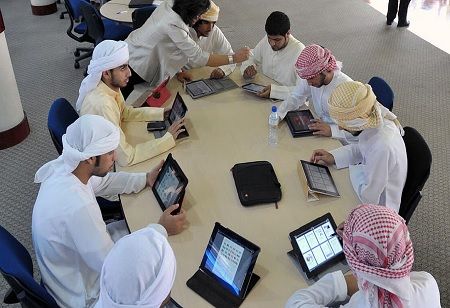-
- UAE revises study abroad norms, prompting Saudi scholars to push for stronger school-university collaboration.
- New regulations aim to boost career-readiness, promote admission to globally ranked institutions, and align with UAE Vision 2021 & Higher Education Strategy 2030.
- Fast-track university licensing launched, enabling UAE varsities to swiftly adapt to market needs with autonomy, accountability, and focus on employability.
Scholars in Saudi Arabia are demanding more school-university collaboration since UAE just revised its study abroad regulations. Earlier this month, the nation approved some requirements for Emirati students seeking higher education in universities overseas. In order to be informed about criteria for institutions eligible for applications.
In addition to boosting career-readiness, the move is designed to monitor foreign scholarship choices in relation to UAE's vision. Teachers emphasized that this step will further increase employability and leadership preparedness.
These standards will promote admission in quality institutions so that students get education competitive at international levels. This will also improve aspirations and academic levels in indigenous schooling systems as the students prepare for better and more competitive universities", Prof Rajesh Mohnot, Finance Department head at College of Business Administration, Ajman University, stated.
He further stated, "It will increase employability and leadership preparedness by meeting global standards in instruction, research, and innovation. The initiative will foster smart public expenditure, where government-funded scholarships are channeled towards effective educational outcomes".
Experts opine that schools and varsities both need to focus on curriculum development focusing on tough academic content, international certifications, and familiarity with research and innovation practices.
"In this way, they can give more attention to the most relevant fields such as STEM, AI, sustainability, and other cutting-edge fields aligning with global trends. I believe the university-school collaborations can develop early career awareness, college readiness, and mentorship that can be a game changer.". Further, focused efforts at integrating critical thinking, problem-solving, and communication skills into the outcomes of learning through standardised test preparation (SAT, IELTS, etc.) as part of mainstream programmes", said Mohnot.
Teachers also emphasized that there will be a greater demand for individualized academic and career guidance, concentrating on university choice, application tactics, and scholarship options. There will be a more robust data-based advisory framework required to monitor international rankings, excellence by disciplines, and admission patterns.
"These high standards challenge students to deepen their fundamental knowledge, improve critical thinking, and experience more challenging learning activities. All of these qualities are called for at highest-ranked world universities. Furthermore, targeted bridge programs, research experiences, and mentoring need to be provided by universities that introduce students early to the requirements of first-rate academic atmospheres", added Canadian University Dubai provost Dr Adam Fenech.
Through upgrading academic standards, the UAE seeks to develop a highly experienced and educated workforce that is competent to spur innovation and support economic growth.
This strategy is aligned with the National Strategy for Higher Education 2030, which puts great significance on empowering students with technical and practical skills to excel within the public and private sectors and thus contribute to the emergence of a knowledge-based economy. In addition, UAE Vision 2021 highlights the aspiration to utilise the full potential of national human capital through the maximization of Emirati contributions to the labour market and the development of home-grown leaders", Fenech added.
Simultaneously, the UAE's new fast-track licensing and accreditation initiative introduced in April is assisting varsities in maintaining the highest academic standards. This significant move is accelerating the introduction of new education programmes, enabling universities to react more swiftly to the changing demands of the market.
"The new framework is centered on evidence-based KPIs such as graduate employability, research impact, and industry partnerships. This outcome-oriented approach makes higher education more aligned with the UAE's national development priorities and global competitiveness strategy. It also provides universities with more autonomy to take academic and operational decisions, but with accountability for student outcomes, innovation, and contribution," said Dr Anita Patankar, Symbiosis Dubai executive director.
Teachers pointed out that the transformation is substantially cutting down on administrative workload, enabling universities to concentrate on strategic enhancement.
The new process is a paradigm shift from difficult, time-consuming approvals to a simplified and predictable model. For universities such as GMU, this has reduced documentation, allowed us to plan more effectively, match programs with strategic timelines, and react quicker to upcoming industry needs; in the end, better budget planning and resource management," Prof. Manda Venkatramana, Acting Chancellor, Gulf Medical University, Professor and Consultant Surgeon, Thumbay Hospital replied.
🍪 Do you like Cookies?
We use cookies to ensure you get the best experience on our website. Read more...

